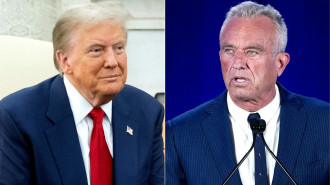New counter-terrorism law in the Philippines endangers human rights: HRW
New counter-terrorism law in the Philippines endangers human rights: HRW
Legislation in the Philippines is set to overhaul anti-terrorism laws, and human rights groups are concerned about the implications.
2 min read
People are marching against the bill [Getty]
Activists are calling on the Philippines to halt anti-terrorism legislation that would give authorities power to arrest and detain government critics – under the pretext of fighting terrorism.
Earlier this week the Philippines' House of Representatives passed the legislation, which is to be signed into law by President Rodrigo Duterte, which will create a counter-terrorism council appointed by the president and will give them the authority to designate individuals and organisations as terrorists.
The draft law uses a broad definition of terrorism that can subject suspects, apprehended without a warrant, to weeks of detention prior to an appearance before a judge.
A special body composed mainly of cabinet officials appointed by the president would provide the authority to enforce the law.
"The Anti-Terrorism Act is a human rights disaster in the making," said Phil Robertson, deputy Asia director at Human Rights Watch.
"The law will open the door to arbitrary arrests and long prison sentences for people or representatives of organizations that have displeased the president."
The legislation would replace the existing Human Security Act of 2007.
|
Under existing law, terrorism suspects must be brought before a judge in three days.
Human Rights Watch believes that anyone taken into custody should appear before a judge within 48 hours.
The draft law also makes it a criminal offense to "incite others" to commit terrorism "by means of speeches, proclamations, writings, emblems, banners or other representations tending to the same end".
The law, which does not define incitement, poses a danger to freedom of the media and freedom of expression by providing an open-ended basis for prosecuting speech, HRW said, adding that the broad role of the anti-terrorism council under the new law places people’s liberty rights at considerable risk.
"The new counterterrorism law could have a horrific impact on basic civil liberties, due process, and the rule of law amid the Philippines' shrinking democratic space," Robertson said.
"The Philippine people are about to face an Anti-Terrorism Council that will be prosecutor, judge, jury, and jailer."







 Follow the Middle East's top stories in English at The New Arab on Google News
Follow the Middle East's top stories in English at The New Arab on Google News
![The new film casts Israeli actors to tell the story of Mary while leaving out Palestinians [Getty]](/sites/default/files/styles/image_330x185/public/2024-11/GettyImages-2172155541.jpg?h=199d8c1f&itok=wJWyXDEQ)
![Ben & Jerry's has taken Unilever to court for its alleged attempts to silence it [Getty]](/sites/default/files/styles/image_330x185/public/2024-11/GettyImages-2183900214.jpg?h=199d8c1f&itok=jEcYtQ64)
